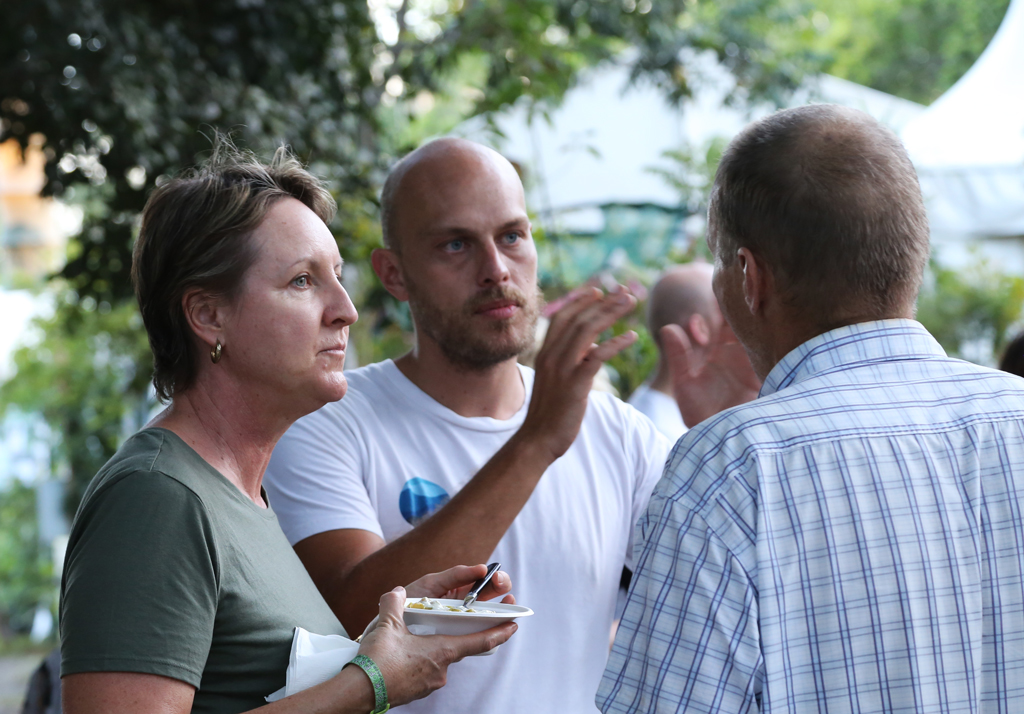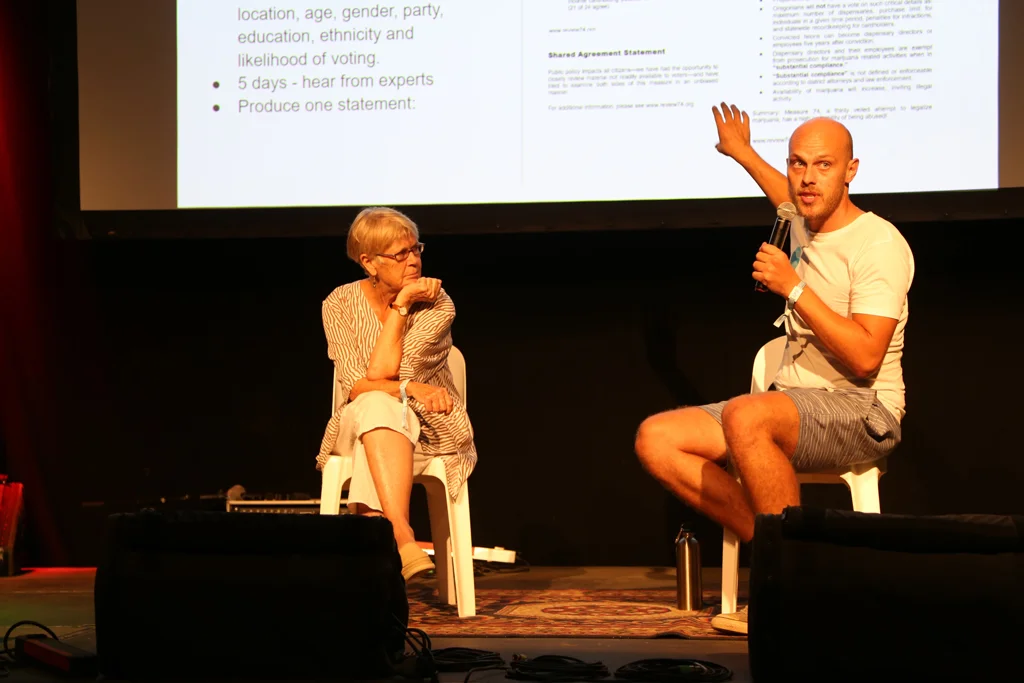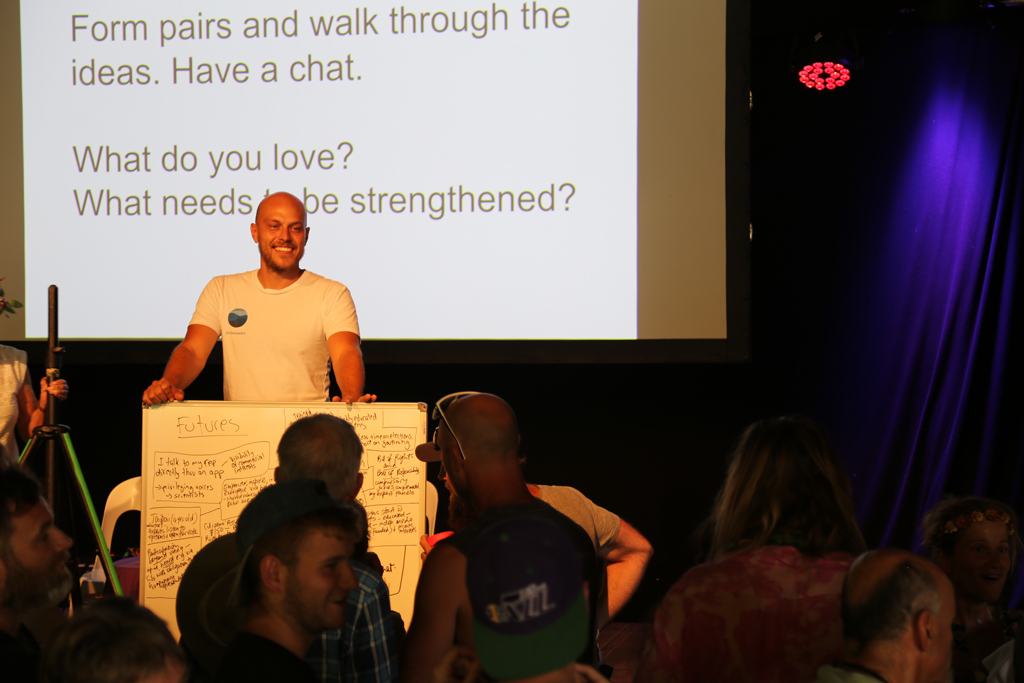Dion McCurdy On How Social Enterprise Can Be Used To Empower Democracy
Dion is a freelance lawyer, social tech entrepreneur, democracy advocate, expert and speaker. He is the co-founder and CEO of NewVote.
With degrees in political science, psychology and law, he has recently been conferred the title of Adjunct Associate Lecturer at the School of Political Science and International Studies at the University of Queensland.
Dion recently spoke at the Global Forum on Modern Direct Democracy in Rome on the topic, "What Technology Is Making Democracy More Democratic" and co-facilitated a 6-day listening and workshop series at the Woodford Folk Festival, 'Redesigning Democracy".
Dion discusses his experience in developing NewVote and shares insights into how social enterprise can be used to empower the community to become more politically engaged to create positive social impact.
Highlights from the interview (listen to the podcast for full details)
[Thomas Long] - Can you please share a bit about your background and what lead you down the path of social enterprise. [01:49]
[Dion McCurdy] - Well, my background is in law and political science and psychology. I studied those at the University of Queensland and I think I'm probably like many people in my generation growing up with a huge series of world events that, essentially threaten our wellbeing. We're a generation that thought, ‘let's come up with solutions.’ I think we're a generation that wasn't that necessarily lost in pessimism, that had some hope that we can make a difference in the world. This is a critical period of time that we're living through right now. The massive technological changes, social upheavals, the tech and our environment is changing. I think there's a lot of people, my generation that have really tried to make practical differences so that we end up with a world that has a good standard of living, for us and our children. So I spent a great deal of time thinking about what it is that I want to do with my life. I'm not opposed to having comforts; you don't have to be sort of any kind of anti-capatalist to run a charity, but I certainly want to make an impact in the world that is positive before I simply look after my own interests.
I think that's a really interesting point, especially when you're talking about the generational differences in how we're entering into a new era and we’re seeing that with the advancement of technology, the advancement of social enterprise. For our listeners who maybe don't know about the work you're doing, can you tell us a bit more about the NewVote program? [03:28]
We are a social enterprise, but we don't have a for-profit component. We're a registered charity and that's an educational charity and we're about to become an approved research institute. So NewVote’s purpose is about advancing education and enhancing democracy and the primary way that we do that is through a democracy app, which is a connection between people and their leaders and we can apply this to a multitude of different circumstances. The local school could use it, the university, the unions, businesses, NGOs, and our vision is to be eventually used by government in the jurisdictions; local, state, federal and internationally. So that essentially, direct democracy, which is voting directly on issues, and deliberative democracy, which means, considering the evidence, being inclusive of all voices, doing a trade off of the pros and cons of the decision and really just making sure that people are informed before they vote. That's deliberative democracy. Those are the two things that we're really trying to ensure or we're trying to put into the app.
It sounds like an interesting platform. What have been your greatest challenges with the NewVote program? [05:09]
Well, our greatest challenges; I picked probably one of the hardest projects to ever try to do. I've gone through and applied for many kinds of grants. There's not a lot of grants for what I'm trying to do because there's a lot of groups that say, ‘oh, there's a bit of politics there’ and they just walk away, they don't wish to give them any kind of trouble. There's a lot of grants out there for profit organisations and we don't fit into that category. I think it's probably easier if you're trying to produce a product, than it is to produce a service and particularly a software service, people's expectations and technology are extraordinary high, so people are used to the the Facebook and Google interactions. Those companies are now just worth billions, billions and billions. I can fly people to the moon if they wanted to, and so, people just getting used to perfect kind of apps, so it really does make it quite hard for a smaller player to enter that market because you're having to say “please forgive us. It's not going to work as good as Facebook, we are still on a journey and we're going to take time before the UI; the user experience will really be top notch.” So I think my journey has probably been harder than many because of the tech component and because of the nonprofit component and because it's political. We're independent, we're not partisan, we are trying to be the infrastructure in terms of direct democracy. But the optics of it, the people just looking at it, they're not fully aware. They'll make a snap judgment and they'll say “We don't want a bar of this”. So it's been a lot of hard work. But I'm proud to say we're getting there now.
That's a good topic because I feel like a lot of other social enterprises are having similar issues, especially in regards to advanced technology, and expectations of technology and making their way to grants and showing the value of what they're doing. What advice would you give our listeners who are keen to start their own social enterprise, but are finding it hard to take the leap? [07:19]
Well, I think you need to be pretty well prepared before you do that. I had what they described it in the startup world as ‘quite a long runway.’ I worked for several years as a lawyer and I've built up my own savings and then I switched to a job that I work part time, so three days a week on as a lawyer and two days a week on social enterprise. I did that for a year and then I went full time into this and so that cash that I'd saved and that period of time where I had both income and the time to really develop my project is what they call a long runway. It gives me plenty of time before I actually have to get into the year and I think it's wise to do that. Probably where people struggle is if they just try to jump 100 percent into something. Mine is a very complex kind of project, but all projects require time. They require a lot of thought and a lot of planning.
You're best off really learning the skills of a startup before you put yourself in a financially precarious position.
Where possible, definitely try to be using other people's money, so then you have a backup that it's just supporting you. Don't make that leap unless you've actually got the time it needs to develop it because, if nine out of 10 businesses fail, then we’ve got to acknowledge that, we've got to learn from that, we're going to not be the nine out of 10. What makes that one of 10 special? I think planning has a hell of a lot to do with it. But I think probably more than that and I don't know if this is answering the question, but I just want to say,
I think resilience is the key skill of an entrepreneur.
I've had some successes with NewVote, some great successes, things that I'm very proud. But that doesn't mean that every single day I'm not capable of being hit by some really bad news, and something that makes you think “Oh God, what am I doing, this is not working the way I want it to.”
Any number of things might happen and it's a rollercoaster ride. No matter how good you are, and no matter how good the idea is, no matter how much support you have, it will always be a roller coaster ride. And so you have to accept that starting out and you have to have high, high levels of resilience.
That means just get hit and then just get back up and keep going. That's the best advice that you can give because nobody can stop someone that's passionate and that is driven, that is doing something that they want to do. No one can stop them except themselves and giving up.
I think that's a fantastic insight in both planning, preparation and having that resilience to push on when you do have those dips in the rollercoaster. [10:41]
Thanks. It's hard fought experience that has given me that answer.
So what are the keys to measuring and communicating your impact?
Well we are in startup phase and so we're still doing what startups do, which is learning. We are a learning organisation and what we do, is we put our service out there in the community. We see how they interact with it, we get their feedback and then we make changes and then we go to the next community or back to that community. So we can't say at this stage that we’ve been highly successful in getting an app that has many users, we hope to be there very, very soon.
We're starting a series of trials with a large number of organisations and our specific kind of problem is that we need to not just be a platform where people have their say, but a platform where people have been heard. So, for this stage of development, what we need to work with is organisations that have the leaders willing to engage with the platform. That's what we're about to start now. The most important measures will be a feedback loop occurring where people use the app, they vote on something, the leader listens to what they say and a result occurs and leader makes a decision and a result occurs and then people see that they can actually use their phone or their computer to vote on something, and actually see that happening in real life. That'll be the first real impact that we're having. Until then, what we're doing is just developing and learning what we're doing. I've had a great time. I've spoken to a number of festivals and so on and the feedback I get from the talks that I give are very positive. Last Christmas we went to the Woodford festival and we were just extremely humbled and honoured to have the opportunity to co-host a workshop called ‘Redesigning Democracy’. That was across six days and everyday we went through a design process essentially using the festival as a design sprint and we got incredible feedback from that. People came up to us and said this is essentially restoring their faith in humanity. To hear that is really impactful. So I guess we have the anecdotal evidence that we're doing the right thing at the moment and we hope pretty soon to have the quantitative evidence that we're making an impact.
That's an interesting insight. Just staying adaptable, learning as you go. That's a really important aspect of it. Are there any particular inspiring projects or initiatives that you've come across recently which you believe are creating some really positive social change? [13:36]
An organisation that I've known about for quite a while, but they've been shaking things up so I think it qualifies to answer that question. It's called AIME, Australian Indigenous Mentoring Experience and it is a registered charity and educational Indigenous corporation. What they do, is they partner students from high schools, Indigenous students with university students and the program is very well run and it's very effective. They record the results. The impact is that Indigenous students are at high school at much higher rates and going to university and completing university. So these are the measures that they're using. It's been an incredible program that was started off by a 19 year old, Jack, who is a social entrepreneur from, let's say, 10 years ago and he's not satisfied with sticking with what he knows and what they're doing, what they do well. He’s gone global, which is a massive change and so going global generally means going to the US and he is a guy that has a huge amount of vision and he backs himself, which is what you need to do. And so he's done rather than entrepreneurship, they call it intrapreneurship. There's a version when you're inside an organisation that already exists, but you're exhibiting entrepreneurial leadership. They're essentially trying to create a new model that would allow this organisation to spread to every country in the world. And it's already made huge, huge social impact here in Australia, in terms of closing the gap with Indigenous youth. It's making a huge impact on the First Nations people of the United States, on the black population in the United States. And they've already opened one up in Africa for example. So it started with a very, very simple idea. Jack went to one of the prestigious schools in Sydney for a visit and he was from Redfern and he just saw this huge dichotomy between the way that one class of society was being educated, versus the other side of things. He got a bunch of his mates and they started this organisation off just like that. And for him, it was getting the university on board that said “yep, we're going to fund this because we want to see this impact happening”. So, it's about finding these cataclysmic moments. And so Jack’s next cataclystic moment is that he's booked a plane, 200 seats to come from the United States to Australia to teach a whole bunch of young, enthusiastic world changing people about the program so they can go back there and they can spread it. So you know, these changes can happen with just a start, with an idea and then validate that idea and then the world's your oyster.
It sounds like it’s generating a lot of positive social change. So are there any books that you'd recommend to our viewers? [16:53]
The first book is directly on creating your own startup. It's called the ‘Lean Startup’ by Eric Ries, and you'll probably hear about this book a few times and if you're like me, you'll hear about it quite a few times before you actually read it.
Stop ignoring this advice and read the damn book.
It's actually really, really important because he's synthesised a whole bunch of experiences in there and stories that will actually really elicit the understanding that you need around startups. His definition, if I remember correctly, is a startup is a learning organisation that is operating in an environment of extreme uncertainty, and if that just clicks with you, “yep, that sounds like a startup” then you're already on the right page.
If that doesn't sound right to you, then read it because you will save yourself a whole lot of time, a whole lot of money, a whole lot of dead ends if you actually follow that kind of advice.
And I will just give one other recommendation. In my area, there's a book that's called “Against Elections - The Case for Democracy” and it's it's written by a Belgian, David Van Reybrouck, but if you just google that title, you'll find it. It's very short, very to the point. And it is incredibly informative. Essentially it's around understanding democracy and the fact that voting in elections is not synonymous with democracy, it's an aspect of it. It's a type of democracy that we'll call representative democracy and there's a heck of a lot more to democracy, and people are a little bit confused. There's a lot of distrust around democracy. There's a lot of lack of confidence in democracy and trust in government and people don't necessarily know that democracy also might be the problem, but it can also be the solution. That’s as simple as I can say it, so check it out.
Initiatives, resources and people mentioned on the podcast
AIME, Australian Indigenous Mentoring Experience.
Recommended books
Lean Startup by Eric Ries
Against Elections - The Case for Democracy by David Van Reybrouck










